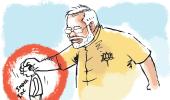'India is possibly the most fiscally constrained market in the region.'

The re-emergence of the US-China trade spat has come as a major blow to the global financial markets that were already reeling from the impact of the COVID-19 pandemic.
"The second quarter of the financial year 2020-21 should be the bottom globally, including for India," Thailand-based Dan Fineman, co-head of equity strategy for Asia-Pacific at Credit Suisse, tells Puneet Wadhwa.
Is the market recovery from their March lows sustainable?
From a six-12 month view, the markets can rise above the current levels on easing lockdowns and aggressive policy response.
That said, China-US tensions may act as sentiment damper.
The pandemic should remain by far the top variable for the global markets.
The short-term pullback we anticipate will largely result from a reassessment of earnings expectations.
Once more realistic earnings numbers are applied, some valuation metrics look quite stretched.
Emerging Asia is our favourite on valuations, structural growth and gains from a bottoming of global economies.
Can the pandemic take the US-China relations to a new low?
The US-China relations will remain tense at least through the US presidential election and possibly beyond.
From a long-term perspective, this clearly is not positive, but the impact on the Asian economy in 2020 should be less than in 2019.
The pandemic now matters much more for the markets and economies than the trade war.
Tariffs may not be extended to new products, but one cannot rule out higher rates on exports already tariffed.
Are the markets factoring in an escalation in the US-China trade spat?
The US and China will continue seeking a financial de-coupling but do not expect a great impact on investors.
China's promotion of the renminbi as an alternative international reserve and trade currency will likely take years if not decades to succeed.
 Moves to force Chinese firms to de-list from US exchanges could have legs, but we do not foresee much pain for investors.
Moves to force Chinese firms to de-list from US exchanges could have legs, but we do not foresee much pain for investors.
Most likely, Hong Kong and mainland exchanges would find ways to accommodate relisting.
There are expectations of another round of stimulus by the US Federal Reserve. Will other central banks follow?
Global monetary and fiscal easing will continue.
The case for a continued monetary easing and a dip in real rates over the medium term to significantly negative territory across developed markets is strong.
Big increases in public debt will need to be covered, and it seems more likely that central banks will encourage an increase in inflation and cut nominal rates.
Policy rates can be cut to zero or below, and the US Fed and European Central Bank can follow Bank of Japan's path in capping bond yields.
If we turn to monetary policy within Asia Pacific itself, we do not expect as much easing as in the US and Europe.
Growth in much of the region should prove more resilient than in the West.
How does India appear as an investment destination compared to its Asian peers?
We are underweight on India that entered this crisis with weaker economic momentum than almost all its Asian peers, but is now being hit harder by the virus than others in the region.
Constraints on the fiscal policy give the government less capacity to support the economy and the markets than in other countries.
We expect a reversal of the emerging markets sell-off, as the dollar rally loses strength and the global economy starts to dig out of its hole, but flows to India will likely lag.
It is fairly easy to group markets according to their success in controlling the virus domestically.
Clearly, Taiwan, Hong Kong, China, and South Korea lead the pack, while the Philippines, India and Indonesia are struggling the most.
Both the Philippines and India seem the most problematic in the APAC region regarding the ability to control the pandemic without stringent lockdowns, and neither market has strong leverage to the global currency realignment.
India is possibly the most fiscally constrained market in the region.
Your view on global growth in the coming quarters?
The second quarter of the financial year 2020-21 should be the bottom globally, including for India, but GDP will take a long time to return to pre-COVID-19 levels.
North Asia should see the fastest recovery due to its success in battling the pandemic and leverage to cyclical and structural growth in technology.
As regards India, we would like to see greater stimulus and more support for the financial sector, but understand the constraints posed by the fiscal situation.
To avoid a downgrade, the government needs to supply enough support to keep the financial sector healthy, but can't push up the deficit to levels that would worry rating agencies.











